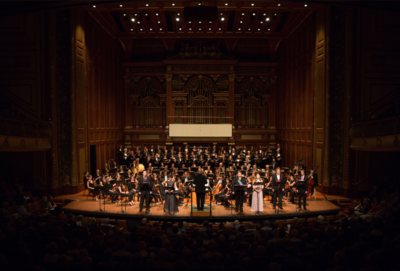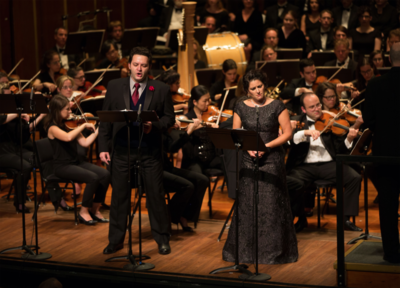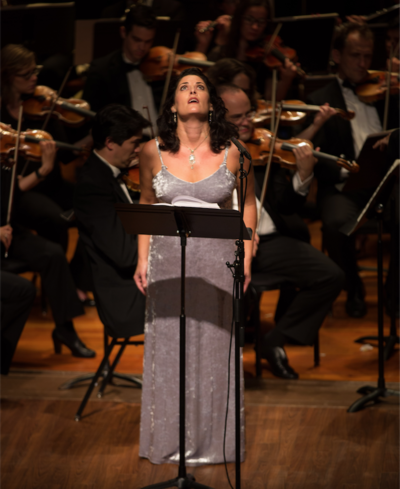Trial By Fire: Odyssey Opera Celebrates Joan of Arc

Odyssey Opera performs The Maid of Orléans, September 16. Photo: Kathy Wittman.
By Olivia J. Kiers
When asked to name an opera, the average person will likely choose a perennial favorite by Mozart, Wagner or Verdi, simply because they are the most performed in our century. Boston-based Odyssey Opera aims to broaden those horizons. Founded in 2013 by Gil Rose, who also founded the award-winning Boston Modern Orchestra Project in 1996, Odyssey Opera revels in underperformed operas. This season, it travels back in time to Europe in the 14th and 15th centuries with five productions that cover the Hundred Years’ War and its most remarkable combatant, Joan of Arc.
“Joan of Arc has been a rich resource for composers over the centuries,” according to Rose, who calculates that there are at least 25 operas that deal with some aspect of the Hundred Years’ War or Joan of Arc. “She is a blank slate in a way… If you want a feminist, she was a feminist. If you want a spiritual leader, she was a spiritual leader.”
The season opened on September 16 with a concert performance of Pyotr Ilyich Tchaikovsky’s The Maid of Orléans. “Every September since we have formed, Odyssey Opera has opened the season with a big, grand opera in concert,” Rose explained. “The Maid of Orléans was always on my shortlist for that slot.” This was a Boston premiere—indeed, The Maid of Orléans has been produced only a few times in North America. Walking down Huntington Avenue on my way to New England Conservatory’s Jordan Hall, I found myself leading the way for a couple who traveled from Canada to see this performance.
Known today for his popular ballets like The Nutcracker, Tchaikovsky was also a prolific opera composer and Joan of Arc was his longstanding fascination. According to the program notes, Tchaikovsky was writing poetry about Joan of Arc at the astonishingly early age of six. When The Maid of Orléans debuted in Saint Petersburg in 1881, it was a grand success despite the disapproval of Tchaikovsky’s Russian rivals, who objected to the opera’s “Grand Parisian” style and Western European source material.
“This opera in particular is attractive to first-time opera-goers because it’s full of sweeping melodies and big choral writing—a very flashy, virtuosic piece full of bravura,” said Rose. “We put everything into providing the most scintillating musical experience we can… To those who have not yet experienced live opera,…you just have to go and let your hair be blown back by the experience.”

Aleksey Bogdanov and Kate Aldrich. Photo: Kathy Wittman
The Maid of Orléans certainly delivered. The scale of this concert was enormous. Every instrument from cymbals to a pipe organ was involved, as well as a large chorus. Kate Aldrich performed a dutiful yet spiritually tortured Joan of Arc divided between four loves: her father (Kevin Thompson), her king (Kevin Ray), a knight named Lionel (Aleksey Bogdanov), and God. In Tchaikovsky’s opera, Joan constantly feels she has betrayed or abandoned one or another of these four, all the while receiving a mix of praise and condemnation. English supertitles were provided to help follow the action, but they were not needed to understand the raw emotion behind the Russian lyrics. The mere volume-level of the chorus shouting Slava! (Glory!) in Act III was stirring enough.
A nice touch was placing a small chorus of “angels” on the balcony level. During Joan’s visions, Aldrich stared in rapt devotion up and beyond most of the audience towards their silvery melody, a simple trick that was profoundly moving.

Kate Aldrich as Joan of Arc. Photo: Kathy Wittman.
Unfortunately, there were some moments when The Maid of Orléans suffered from being performed in concert only. A ballet at the beginning of Act II would have featured dancers dressed as gypsies and clowns in a fully staged production. As a music-only interlude, it was a tedious delay in the story. In Act III, the combatants-to-lovers transition that occurs between Joan and Lionel is confusing without staging, despite Aldrich and Bogdanov’s best expressive efforts.
This should not deter anyone interested in Odyssey Opera’s remaining season, which will either be fully or partially staged. Next up in late October is Donizetti’s L’Asseido di Calais, a rarely-heard Italian work that focuses on King Edward III of England’s long siege of Calais (familiar to art historians through Auguste Rodin’s famous sculpture, The Burghers of Calais). Following that are three more operas featuring Joan of Arc, composed by Dello Joio, Honegger, and Verdi.
Rediscovering one of history’s most fascinating heroines all season long is a brilliant way to engage new audiences while delighting opera connoisseurs. With an opener like The Maid of Orléans, Odyssey Opera has set the bar high, yet they are obviously up to the challenge.
